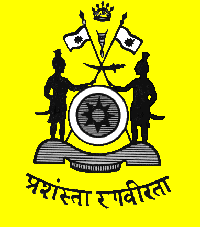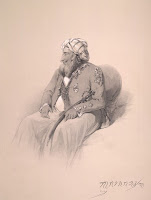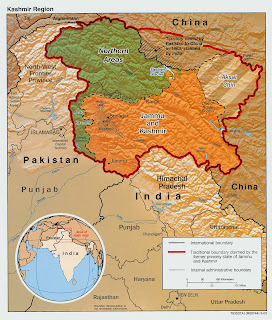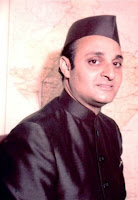Sunday Deposed Monarch Blogging: House of Singh
 The modern state of Jammu was created in 1820 by Rajit Singh, Maharajah of a Sikh kingdom in Punjab. A kingdom had existed in Jammu since ancient times, as in many of the other territories that lay between the Hindu and Islamic civilizations, Jammu and Kashmir were often overrun by invaders from either side. Rajit Singh conquered Jammu in the process of creating a Sikh empire in Punjab, bringing the mostly Muslim population of Jammu under rule of an alien religion for the first time in centuries. Maharajah Singh then conferred the title Raja upon Gulab Singh, head of a junior branch of what had been the ruling family of Jammu since roughly the 9th century. Gulab Singh had initially served in the armies that fought Maharajah Singh, but sought service within the latter’s court after the fall of Jammu and eventually ably commanded some of the Maharajah’s armies.
The modern state of Jammu was created in 1820 by Rajit Singh, Maharajah of a Sikh kingdom in Punjab. A kingdom had existed in Jammu since ancient times, as in many of the other territories that lay between the Hindu and Islamic civilizations, Jammu and Kashmir were often overrun by invaders from either side. Rajit Singh conquered Jammu in the process of creating a Sikh empire in Punjab, bringing the mostly Muslim population of Jammu under rule of an alien religion for the first time in centuries. Maharajah Singh then conferred the title Raja upon Gulab Singh, head of a junior branch of what had been the ruling family of Jammu since roughly the 9th century. Gulab Singh had initially served in the armies that fought Maharajah Singh, but sought service within the latter’s court after the fall of Jammu and eventually ably commanded some of the Maharajah’s armies.
 Gulab Singh’s reward was Jammu, and he made the most of his opportunity. By force of arms the Raja expanded his territory, fighting against Afghans, Tibetans, and Chinese, as well as local enemies. Raja Singh remained neutral in the bloody Anglo-Sikh wars of the mid 19th century, and in 1846 became, for all intents and purposes, a vassal of the British state. The British conferred the title of Maharajah on Singh and confirmed his rulership of Jammu and Kashmir. After weathering several rebellions and considerabl intrigue, Gubal Singh died in 1857 and passed the kingdom to his son.
Gulab Singh’s reward was Jammu, and he made the most of his opportunity. By force of arms the Raja expanded his territory, fighting against Afghans, Tibetans, and Chinese, as well as local enemies. Raja Singh remained neutral in the bloody Anglo-Sikh wars of the mid 19th century, and in 1846 became, for all intents and purposes, a vassal of the British state. The British conferred the title of Maharajah on Singh and confirmed his rulership of Jammu and Kashmir. After weathering several rebellions and considerabl intrigue, Gubal Singh died in 1857 and passed the kingdom to his son.
 In 1925 Gulab Singh’s great grandson, Hari Singh, ascended to the throne of Jammu and Kashmir. Despite the fact that most of his subjects were Muslim, Maharajah Singh resisted inclusion in Pakistan in 1947. During the Partition between India and Pakistan, rulers of individual princely states were typically allowed to determine which country to join. Hari Singh disliked Congress, but disliked the Muslim League more, and for a time attempted to carve out a space for Jammu and Kashmir as an independent state. Jockeying between Pakistan and India made this impossible; in late 1947 a group of Pakistani tribesmen entered Kashmir, and Indian troops responded. In spite of the preference of his subjects, Maharajah Singh, a Hindu, decided to join India. This decision helped spark the First Indo-Pakistani War, which resulted in the de facto division of Kashmir between Pakistan and India. At that point everything became fine and Kashmir has not ever been heard from again.
In 1925 Gulab Singh’s great grandson, Hari Singh, ascended to the throne of Jammu and Kashmir. Despite the fact that most of his subjects were Muslim, Maharajah Singh resisted inclusion in Pakistan in 1947. During the Partition between India and Pakistan, rulers of individual princely states were typically allowed to determine which country to join. Hari Singh disliked Congress, but disliked the Muslim League more, and for a time attempted to carve out a space for Jammu and Kashmir as an independent state. Jockeying between Pakistan and India made this impossible; in late 1947 a group of Pakistani tribesmen entered Kashmir, and Indian troops responded. In spite of the preference of his subjects, Maharajah Singh, a Hindu, decided to join India. This decision helped spark the First Indo-Pakistani War, which resulted in the de facto division of Kashmir between Pakistan and India. At that point everything became fine and Kashmir has not ever been heard from again.
The state government of Jammu and Kashmir terminated Hari Singh’s reign in 1951. His only son, Karan Singh, was made President of the province at the same time, and Governor of the state of Jammu and Kashmir in 1964. Hari Singh died in 1961, but his son’s political career continued to develop. He successively became Indian Minister for Tourism, Minister for Health, and Minister of Education between 1967 and 1980. In 1990 he was named Ambassador to the United States. Karan Singh has written several books, and has recently been mentioned as a possible candidate for the Presidency of India, a largely ceremonial position. Prospects for a return to the throne seem grim, as Mr. Singh seems to have better prospects, and there is little support in the area for the return of a Hindu monarch.
son, Karan Singh, was made President of the province at the same time, and Governor of the state of Jammu and Kashmir in 1964. Hari Singh died in 1961, but his son’s political career continued to develop. He successively became Indian Minister for Tourism, Minister for Health, and Minister of Education between 1967 and 1980. In 1990 he was named Ambassador to the United States. Karan Singh has written several books, and has recently been mentioned as a possible candidate for the Presidency of India, a largely ceremonial position. Prospects for a return to the throne seem grim, as Mr. Singh seems to have better prospects, and there is little support in the area for the return of a Hindu monarch.
Trivia: What country’s 20th century experiment with constitutional monarchy lasted only two months and five days?


